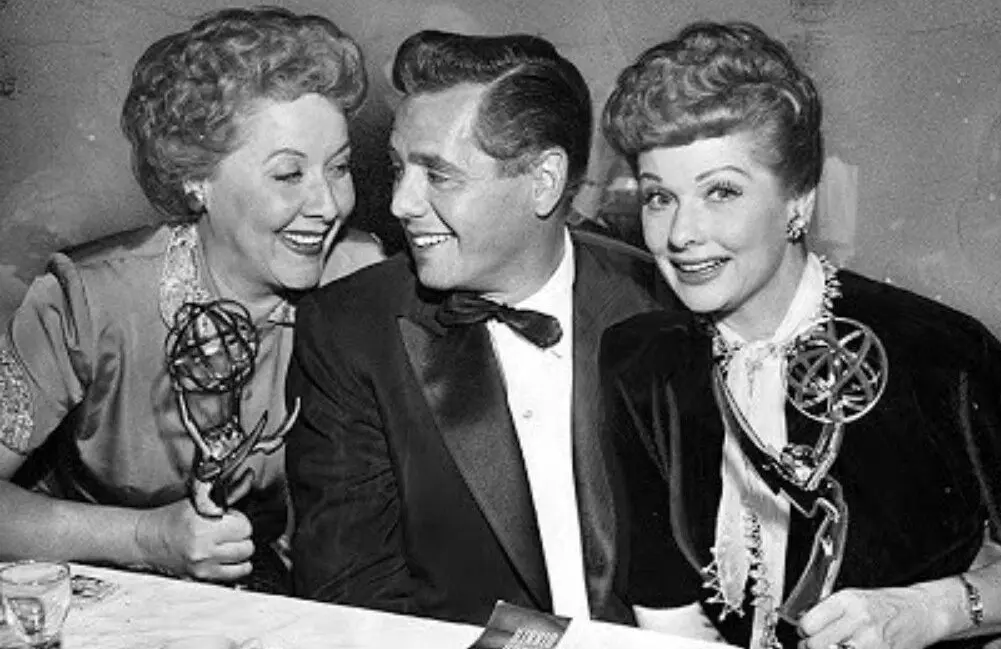Emmys Rewind: When the Stars of I Love Lucy Called Out the Academy
-
 Vivian Vance, Desi Arnaz and Lucille Ball at the 1954 Emmy Awards.
Vivian Vance, Desi Arnaz and Lucille Ball at the 1954 Emmy Awards.Television has changed a lot since the inaugural Emmy Awards were held in 1949 at the Hollywood Athletic Club and broadcast on a local Los Angeles TV station. For starters, only six Emmys were given out that night — and one was to Louis McManus, the man who designed the winged statue that's come to define the ceremony.
More than 70 years later, the Television Academy boasts more than 24,000 members divided into 30 different peer groups (including performers, writers, technicians, and costume designers), with hundreds of Emmys awarded each year on both a national and local level.
As is often the case, the road from there to here was a circuitous one that reflected changing attitudes and the evolution of TV as a medium. To wit, several years before there were categories for writers and directors, advertisers were honored for Best Commercial (Lucky Strike was the first and only recipient of this award). The speed at which the Academy has responded to change, however, has caused some consternation over the years, perhaps never more so than in the early 1950s, a time of expansive growth and innnovation for TV.
In 1952, the "Best Comedian or Comedienne" category pitted TV’s funniest men and women against each other, leading the winner, Red Skelton, to famously pull a reverse Kanye when he told the audience at the Coconut Groove, “Ladies and gentleman, you’ve given this to the wrong redhead. I don’t deserve this. It should go to Lucille Ball.”
TV's first female superstar, Ball's pioneering I Love Lucy had premiered just four months earlier, and she and her co-star/real-life husband Desi Arnaz co-hosted the Emmys that year. Two years later, it was they who would offer to give up (or at least share) their prize for Best Situation Comedy at the 6th Primetime Emmy Awards. “It wouldn’t be right to call our writers up and give it to them, would it? But I wish we could,” Ball noted in her short speech before adding “We’re awful proud to be part of this industry, really we are. We’re trying real hard, and we’re going to keep it up.”
Taking his cue from Ball, when Arnaz stepped up to the mic there was only one group he wanted to highlight. “I just want to say this — and I really mean this — I hope that next year the Academy does not forget the writers.” The consummate showman, Arnaz knew when to pause for audience reaction, so he let the attendees’ applause punctuate his point before adding, “And if we may this year, we’d like to give it right now to Oppenheimer, Carroll, Pugh, and Frawley.”
Jess Oppenheimer, Bob Carroll and Madelyn Pugh received another shout-out earlier in the evening when Vivian Vance, who played Ethel Mertz on I Love Lucy, won the award for Best Supporting Performance by an Actress and thanked the three writers for creating her character.
Watching their speeches today speaks to not only how valued the I Love Lucy writers were to the show's stars, but also how Arnaz and Ball chose to wield their influence at the height of their fame. Using this platform to call out the Academy for not honoring the contributions of those who had created these beloved characters proved to be a watershed moment when the Academy added two writing categories the following year.
The I Love Lucy writing team was nominated at both the 7th and 8th Annual Emmy Awards, but never took home a statuette, losing out to The George Gobel Show in 1955 and The Phil Silvers Show in 1956.
Emma Fraser has wanted to write about TV since she first watched My So-Called Life in the mid-90s, finally getting her wish over a decade later. Follow her on Twitter at @frazbelina.
TOPICS: I Love Lucy, Desi Arnaz, Lucille Ball, Television Academy
- Going Behind the Screens of TV's Most Iconic Homes and Offices
- Lessons in Chemistry's Unusual Pregnancy Test Scene Follows in a Long Line of Classic TV Moments
- Buster Keaton was a silent movie pioneer, but he also became a TV trailblazer who helped with I Love Lucy's launch
- TV Today: Being the Ricardos Hits Streaming, The Bachelorette Ends with a Proposal